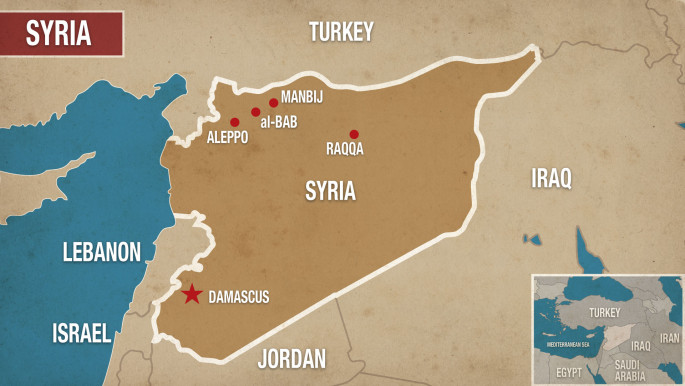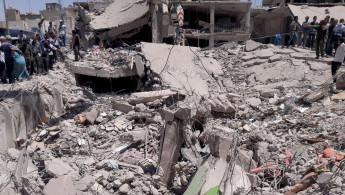What does the future hold for Syria's Kurds?
In the mid-1980s the leader of the paramilitary Kurdish insurgency against Turkey, Abdullah Ocalan, criticised Iraqi Kurdish leader Masoud Barzani. Barzani, Ocalan claimed, was "primitive" for seeking only autonomy for the Kurds he led, rather than full-fledged independence.
Three decades later, Iraqi Kurdistan is an autonomous region which is setting out to negotiate its independence. This comes after a quarter of a century of autonomy, which began shortly after the 1991 Gulf War, when the United States and its allies implemented a no-fly zone to protect them against Saddam Hussein. Its status was solidified by the subsequent US-led regime change in 2003.
In the meantime, Ocalan promulgated his Democratic Confederalism political ideology among his followers. It advocates decentralisation over independence - since it believes the nation state to be a flawed concept - as a way to achieve greater freedom.
Syria Kurdistan - known among Kurds as Rojava, "West Kurdistan" - is ruled by the Kurdish Democratic Union Party (PYD), which Turkey alleges is inextricably linked to Ocalan's outlawed Kurdistan Workers' Party (PKK).
 |
While their self-sufficiency largely revolves around agriculture they are highly dependent on imports for medicine and other such necessities |  |
Since the beginning of the Syrian war it has achieved unprecedented de-facto autonomy. While the PYD advocates a form of federalism for Syria, identical to that promoted by Ocalan, they rule over their own territory and have some clear aspirations for long-term autonomy - much to the chagrin of the Syrian regime, the Syrian opposition-in-exile, Syrian Arab rebel groups on the ground - and Turkey.
While their self-sufficiency largely revolves around agriculture they are highly dependent on imports for medicine and other such necessities. Nevertheless, they control some of Syria's few oil-rich regions and also two major dams they captured from Islamic State control: Tishrin Dam and Tabqa Dam on the Euphrates River.
 |
|
| [Click to enlarge] |
The two dams are responsible for the electricity output upon which hundreds of thousands of Syrians rely. Tabqa Dam has even been described as the Syrian equivalent of Egypt's famed Aswan Dam.
While Rojava's possession of oil is unlikely to elevate it to a position of wealth and affluence of the kind which rapidly helped neighbouring Iraqi Kurdistan develop from a largely village-based agrarian society to an urban society, including high-rise buildings, it's certainly not insignificant.
The chairman of Afrin University, Ahmed Yousef, told Al Monitor last year that Rojava's economic output constitutes 55 percent of Syria's entire gross domestic product.
The question many analysts assessing Rojava's prospects for meaningful autonomy invariably come to is the ability of the Syrian Kurds to defend and consolidate their territory.
"An autonomous Rojava seems quite probable if the US continues to arm and back its Kurdish allies in Syria," said Professor Joshua Landis, the head of Middle East Studies at Oklahoma University.
"Much depends on the United States," he told The New Arab. "The Syrian Kurds are plucky fighters who have made the most of their situation and won the hearts and minds of the West. All the same, they do not have an air force and are surrounded by powerful enemies. Should America's support falter, the military balance of power would reverse itself quickly."
 |
Assad has also told the Kurds of Syria to 'forget' about autonomy, not to mention independence |  |
Landis points out that Turkish President Recep Tayyip Erdogan "has stated many times that he will not allow an autonomous Kurdish state to emerge along its southern border".
"Assad has also told the Kurds of Syria to 'forget' about autonomy, not to mention independence," Landis concluded.
David Pollack, the Kaufman Fellow at the Washington Institute, also believes Syria's Kurds are achieving their objectives in two of Rojava's three cantons - Kobane and Jazira. The Kurds connected these two areas to establish control of territory which stretches across three-quarters of Syria's northern border with Turkey.
The third canton, Afrin, is "much smaller and surrounded by Turkish or other unfriendly forces".
"There I'm not so sure about their prospects," Pollack told The New Arab. "Assad's regime does not have enough forces to take back Jazira and Kobane, but they are still economically dependent on him - so autonomy will be constrained."
He believes if the Syrian Kurds reconcile with their Iraqi Kurdish neighbour, which he deems "unlikely" since they are run by rival parties, they could endure this.
"Finally, I think the PYD will not exercise great control in the southeast, including in Raqqa, where local forces will end up vying with regime and Iranian proxies for influence," he concluded.
The PYD previously suggested in March that Raqqa could be incorporated into their federal region following the Islamic State group's removal. Whether or not that becomes the case, the Syrian Kurds today retain self-rule over swathes of territory - which has some clear prospects of becoming its own distinguishable polity in the war-stricken Fertile Crescent.
Paul Iddon is a freelance journalist based in Erbil, Iraqi Kurdistan, who writes about Middle East affairs.
Follow him on Twitter: @pauliddon



